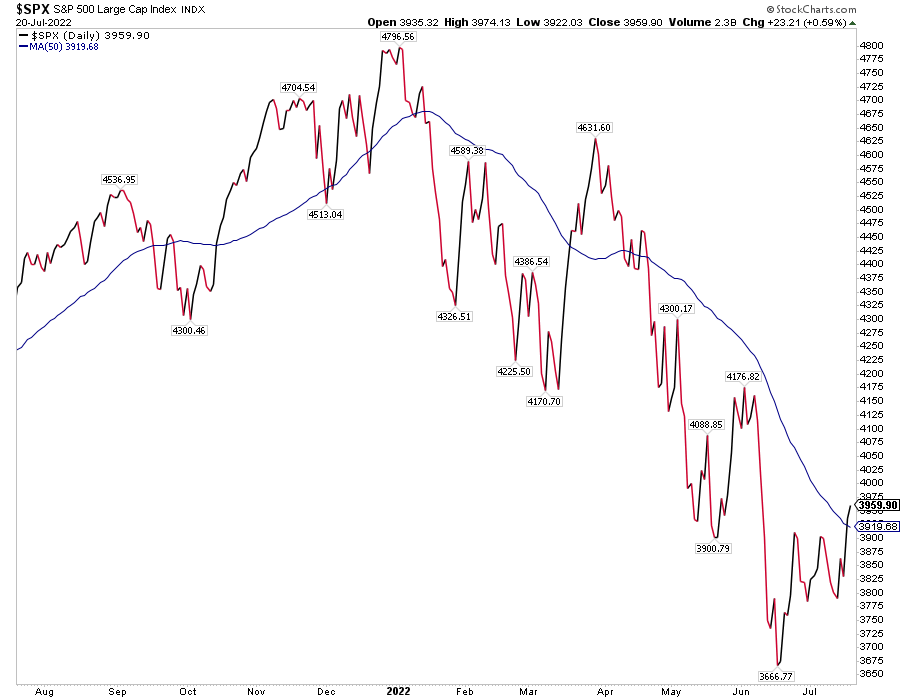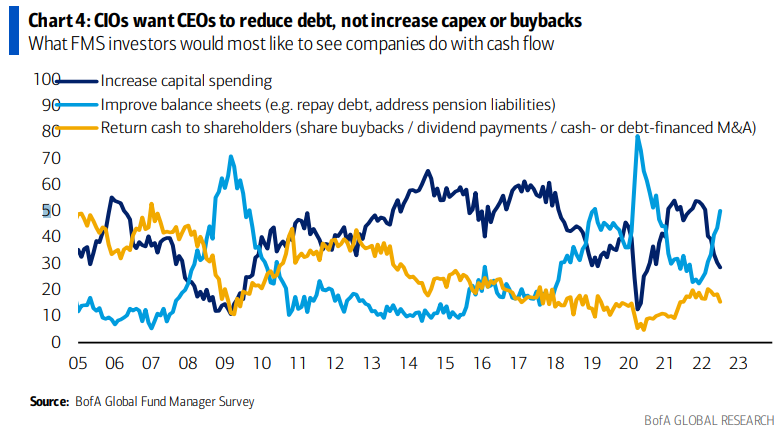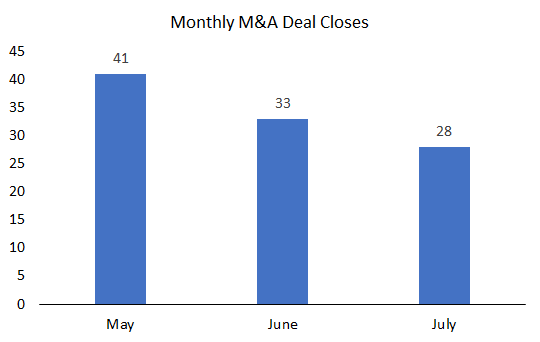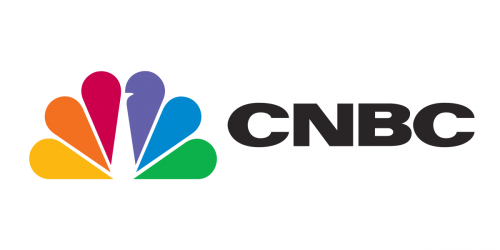- Wall Street Horizon tracks merger dates and events so traders can effectively manage risk
- Amid a slowing economy and uncertain remainder of the year, executives might focus on shoring up balance sheets
- Still, ample cash on hand is dry powder for dealmaking if we avoid a sharp recession
A recent Bank of America Fund Manager Survey revealed that investors increasingly want firms to improve their balance sheets. It’s not surprising given that the economic backdrop grows more uncertain each week. While June’s U.S. employment picture and retail sales data were encouraging, inflation remains hot and regional economic activity reports suggest some spots are struggling.
The second-quarter earnings season is now in full swing. The big banks issued mixed results, but stock price reactions were actually quite good. As other sectors began to report, anxiety about lower-than-expected profits and guidance cuts were somewhat relieved as the S&P 500 managed to rise above its 50-day moving average for the first time since April. So there are some rays of hope in this gloomy environment for consumers and businesses.
S&P 500 Rallies Above Its 50-Day Moving Average

Source: Stockcharts.com
Merger Activity: A Pulse of the Market
One activity type that could further spark a rebound in optimism is corporate acquisition announcements. When one firm buys another, either through a merger or acquisition, it is generally seen as a positive signal about future growth prospects. Moreover, more M&A moves usually happen when company management teams are upbeat about the economy as a whole. Right now, though, investors prefer that CIOs and CEOs tighten their purse strings a bit and hold off on capital spending and returning cash to shareholders (through M&A).
Bank of America Global Research July 2022 Fund Manager Survey: A Focus on Safety

Source: BofA Global Research
Keeping Tabs on Key Merger Events
Amid this strange landscape of a possible turning point in the stock market with very cautious investors and CEOs, one must wonder what the M&A market might look like for the rest of the year. Wall Street Horizon tracks key merger event data so that equity and options traders can better craft their trading strategies. M&A dates including announcements, approvals, close year, and close period are posted so that clients can manage their risk exposure. Spinoffs and corporate breakup data are included, as well.
Signs of a Slowdown
Unfortunately for the bulls, we see M&A deal flow slowing down since May. The total number of M&A closes through July 20 supports the notion of more cautious management of corporate balance sheets right now, though we still could see a handful of closes through the rest of the month. We will be watching this metric as a vital sign of corporate dealmaking as 2022 presses on.
M&A Deals Slowing Into Q3

Source: Wall Street Horizon
Corporate Cash Might Yield More M&A
The good news is that we see a slight uptick in July M&A announcements versus June’s sum. If the economy finds its footing and executives begin to turn more sanguine about the state of the corporate world, then all that dry powder of cash they have might be put to work through M&A. Consider that total corporate cash on hand is near an all-time high just shy of $4 trillion, up more than 60% from a few years ago, according to JPMorgan. To wit, just last week, ecommerce-giant Amazon (AMZN) agreed to buy 1Life HealthCare (ONEM) in a $3.9 billion cash and debt deal.[i]
Ad Spending & Videogames: Unity Buys ironSource
Among the largest recent acquisitions was Unity Software’s (U) agreement to buy ironSource (IS) for $4.4 billion. It was a sign of the times for the two videogame service providers as the digital advertising market cools. The all-stock transaction that crossed the wires on July 13 comes shortly after Unity issued a 4% workforce cut, a troublesome trend playing out across the tech space. Unity’s CEO John Riccitiello cited lower industry valuations but a higher cost of capital when describing the buyout.[ii] Those are two crucial variables that drive corporate merger activity.
A Shifting Foundation in Real Estate
Another mega acquisition took place in mid-June. Dividend investors awoke to the news of Prologis (PLD) buying rival Duke Realty (DRE) in a $26 billion deal. It was the largest commercial real estate sale since the onset of the pandemic, according to The Wall Street Journal.[iii] The Real Estate sector has seen a slew of merger activity over the past year as major shifts in the space cause firms to reassess where they stand amid much uncertainty in niches of real estate such as corporate office space. Warehouses and distribution centers have been particularly attractive given the boom in goods spending since 2020.
The Bottom Line
All M&A moves provide interesting insights into the state of the market and economy. Wall Street Horizon’s merger event data helps clients stay on top of key dates and shareholder filings. These deals help many investor types, including merger-arbitrage traders seeking to pounce on the latest announcements.
[i] https://www.wsj.com/articles/amazon-to-buy-one-medical-for-3-9-billion-11658408934
[ii] https://www.wsj.com/articles/unity-agrees-to-buy-ironsource-in-4-4-billion-videogame-deal-11657732385
[iii] https://www.wsj.com/articles/prologis-to-buy-duke-realty-in-26-billion-deal-including-debt-11655123510
_thumb.png)
_thumb.png)
_thumb.png)
_thumb.png)



_thumb.png)






